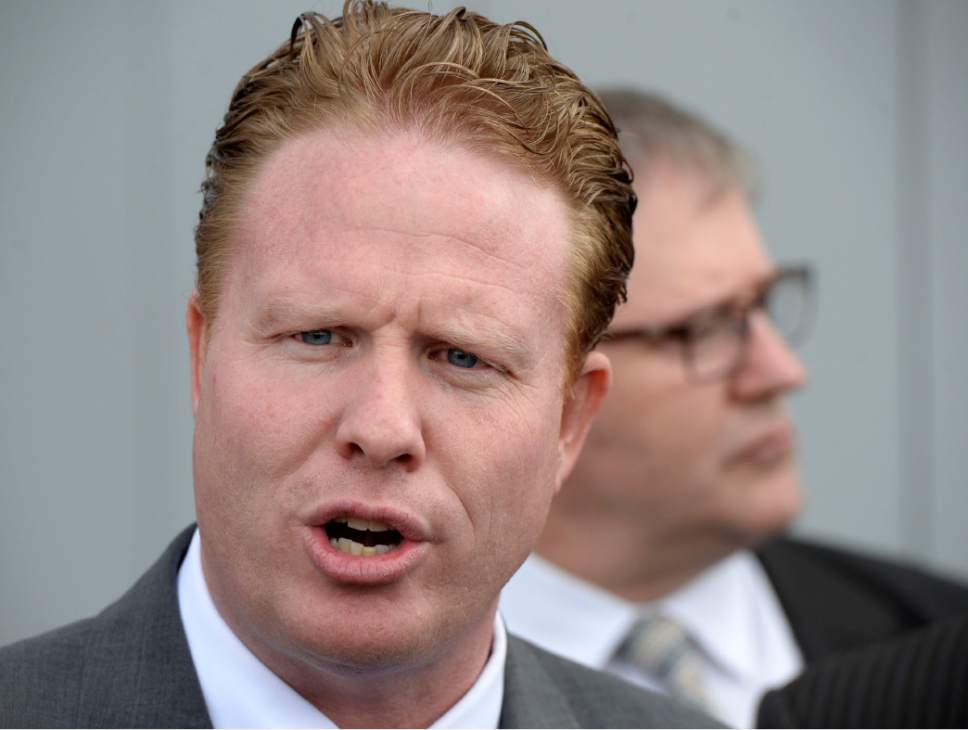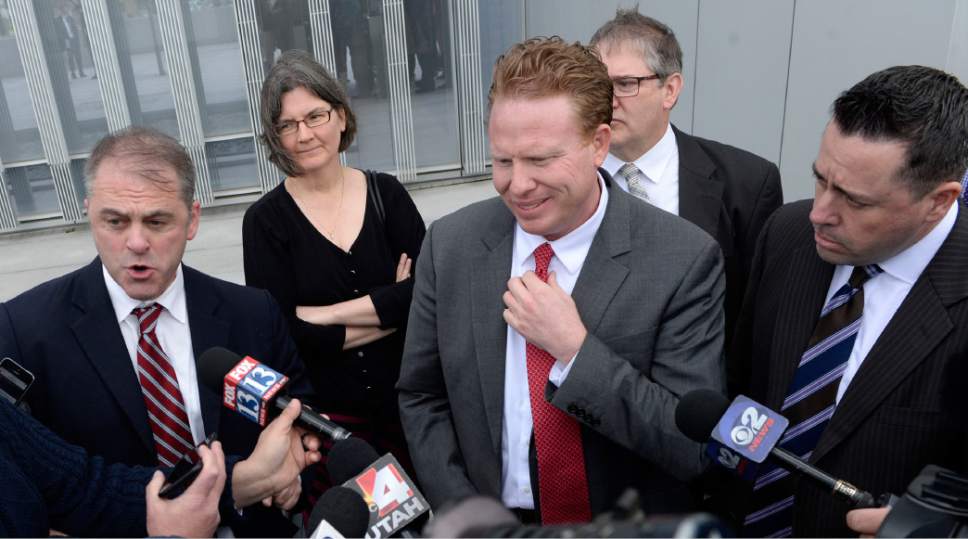This is an archived article that was published on sltrib.com in 2016, and information in the article may be outdated. It is provided only for personal research purposes and may not be reprinted.
Federal prosecutors are seeking to sentence online entrepreneur Jeremy Johnson to decades in prison for actions he was never charged with or was acquitted for, rendering a jury's verdict "meaningless," his attorneys argue in court filings in anticipation of Johnson's sentencing Friday.
Prosecutors are seeking a sentence of up to 265 months or 22 years in prison on his conviction by a federal court jury in March on eight counts of providing false information to a bank but which also acquitted him on 78 other bank fraud-related charges.
"The government thus seeks a sentencing range that is nearly as high as the average sentence for persons convicted of murder (300 months), and higher than that for persons convicted of kidnapping/hostage taking (240 months) or child pornography (97 months)," Johnson's attorneys write in a memorandum filed late Friday.
In their filing, federal prosecutors call Johnson a "constant schemer" and a "self-interested opportunist" whose "philanthropic" efforts "mask what he is doing outside of the public's sight."
"Johnson puts himself above the law at every turn and has absolutely no inhibition in harming others to serve his own needs," says the government memo signed by Assistant U.S. Attorney Jason Burt. "Frankly, a lengthy prison sentence is necessary to protect the public from whatever Johnson's next scheme will be."
The guidelines depend in part on how U.S. District Judge David Nuffer rules on issues disputed between the two sides of whether Johnson caused losses to banks and other companies or saw profits as a result of his conduct.
Johnson had been accused in a sweeping series of indictments of trying to cheat Wells Fargo Bank by creating 37 "shell" companies for processing consumer credit cards after accounts from his I Works operation were placed on industry watch lists because of a large number of chargebacks.
The jury sat through six weeks of evidence and witnesses and engaged in about five days of deliberation before returning verdicts of guilty on only eight counts where they found Johnson submitted false information on applications to Wells Fargo. Several jurors said after the verdict that the only false information they found were the number of employees each of the new companies was purported to employ.
But Burt wants Nuffer to take into account at sentencing not just those eight accounts but all 281 account applications submitted to Wells Fargo, as well as several others that were at different banks, the latter which were not part of the trial.
Juror Kathie Cox, who has been outspokenly critical of the conduct of prosecutors and called Nuffer openly biased against the defense, said Saturday that she was outraged by the government's proposed sentencing enhancements.
"The fact they're bringing in things that didn't have anything to do with our trial to do the enhancement, that's insane," she said.
Cox also took issue with a part of the government's memorandum that claims Johnson, who's in the Tooele County jail awaiting sentencing, appears to have orchestrated an effort to contact three jurors in violation of a court order.
"That's an absolute, flat out lie by prosecutors," said Cox. She said she and two other jurors contacted the office of another attorney on the case, Marcus Mumford, but have not spoken to Johnson's current attorneys, Karra Porter and Mary Corporon.
Porter and Corporon, who began representing Johnson after the trial in which he defended himself, argue that sentencing guidelines should run from no prison time to up to two years.
They also have argued for a new trial on various issues, one of which was that Nuffer didn't allow the defense to present witnesses who would have said that the number of employees on applications was not a factor that the bank or its agents took into consideration when approving new merchant accounts.
The bulk of the arguments in the two sentencing memos is devoted to whether there was a monetary loss or a gain from Johnson's activities that should be taken into account in the sentencing guidelines.
Prosecutors want Nuffer to consider not just the possible losses or gains from the eight accounts that formed the basis of the jury verdict, but all 281 account applications to Wells Fargo, plus several accounts at other banks that were not part of the trial.
Under government calculations, losses to the banks stemming from all accounts reached $23.1 million.
Burt gets to that figure in part by arguing that the money lost was not from consumers who had made charges on their credit cards but from banks, which actually funneled the monies into the merchant accounts.
Johnson's attorneys pointed out that prosecutors did not try to figure in any costs to the businesses and had never identified any consumer losses. The only consumer specifically mentioned in charging documents — identified only by his initials — turned out to be an investigator for the Federal Trade Commission, which sued Johnson and others in 2010, the Friday memo points out.
Prosecutors also previously said on at least two occasions that banks did not lose money and that they were prosecuting on a theory that Johnson intended for them to lose money, the memo says. But Johnson provided reserves to the banks to cover any losses and a personal financial guarantee, negating any argument for intended loss, Porter wrote.
Allowing the government to include losses or gains on conduct for which Johnson was never charged or was acquitted violates his constitutional rights to a fair trial and harms the system of justice, Porter argued.
"Granting the government's request would result in a sentence for Johnson the same as if he had been convicted on all 86 felony counts [and] renders the jury trial here meaningless," she wrote. "The Sixth Amendment [of the Constitution] and fundamental due process require the jury verdict actually to stand for something."
Prosecutors also say the sentencing guidelines for Ryan Riddle, a former manager at I Works who was convicted on the same eight counts as Johnson, should range from 121 to 151 months, or 10 to 12½ years. His attorney, Steven Killpack, told the court that Riddle should face only the lowest sentencing range, zero to six months in prison.
A third defendant, Bryce Payne, who reached a plea agreement before trial, could get from zero to 42 months under that deal.





